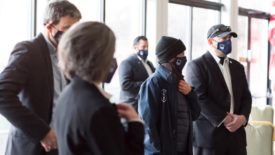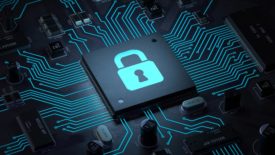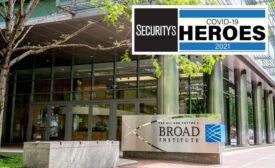Profiles in Excellence
The security industry is changing, as is the profile of a successful security executive. Maintaining the status quo is no longer an option, and ignorance of risks is no longer an excuse for not mitigating them. This topic in Security features game-changing security directors or industry leaders in different sectors. So who is breaking new ground in the security industry, making great strides forward in risk management while better supporting the enterprise as a whole? If you know someone (or are someone) who fits this bill – let us know!
ARTICLES
Security Strategy
Farhan Sahito shares how he's made the transition from physical to cybersecurity, and his experiences in public and private security.
Read More
Profile in Excellence
Putting the pride into healthcare security officer training
Training for healthcare security officers needs to be standardized to ensure staff and patient safety.
August 8, 2023
Profile in Excellence
All hands on deck: How volunteer security prevents violence
The Community Security Service, a nonprofit organization training Jewish communities in proactive security, helps prevent violence by promoting a security-minded culture in houses of worship.
June 13, 2022
Profile in Excellence
Building, managing, and transforming security into a business enabler
After several decades in the security field, Bob Thibodeaux has extensive experience building and managing cybersecurity programs and transforming security into a business enabler.
May 11, 2022
Profile in Excellence
45 years tearing down siloes: Maureen Rush
After several decades dedicated to safety and security, the Vice President for Public Safety and Superintendent of Police at the University of Pennsylvania’s Division of Public Safety semi-retires, but first she shares what she’s learned.
February 7, 2022
COVID-19 Heroes
Broad Institute Security Department supports COVID-19 testing facility
The Broad Institute of MIT and Harvard has served as one of the largest processors of COVID-19 tests in the country. The Security Team has supported these efforts in myriad ways, helping maintain business continuity and ensure campus safety, visitor management, and compliance with COVID-19 safety protocols.
August 6, 2021
COVID-19 Heroes
Associated Grocers of New England’s Risk Management and Loss Prevention teams step up amid pandemic
While enterprises around the globe were shutting down and moving to remote work, frontline food suppliers, transport companies and grocery stores didn’t have that ability. AGNE needed to continue to distribute product to independent grocer members as well as its own stores throughout New England and New York, while also dealing with increased freight and procurement demands into the facility.
August 6, 2021
COVID-19 Heroes
Yale University’s Public Safety Systems and Services team uses existing tech for robust COVID-19 response
By reimagining access control and use of existing system data, Yale’s Public Safety Systems and Services team was able to centralize and organize security technology operations, while providing further value across the entire university.
August 4, 2021
COVID-19 Heroes
Georgetown University’s Office of Emergency Management supports COVID-19 response
Marc Barbiere came to Georgetown about five months before the COVID-19 pandemic, taking over the recently-restructured Office of Emergency Management (OEM) in order to coordinate the University’s efforts to prepare for, respond to, and recover from emergencies.
August 4, 2021
COVID-19 Heroes
The NFL’s GSOC takes center stage in getting players back on the field
As the centralized place for intelligence and information, the NFL’s GSOC played a pivotal role in the League’s pandemic response, streamlining access and infection control, updating business continuity plans, and providing relevant data to enable all stakeholders to make informed decisions.
June 4, 2021
Sign-up to receive top management & result-driven techniques in the industry.
Join over 20,000+ industry leaders who receive our premium content.
SIGN UP TODAY!Copyright ©2024. All Rights Reserved BNP Media.
Design, CMS, Hosting & Web Development :: ePublishing











